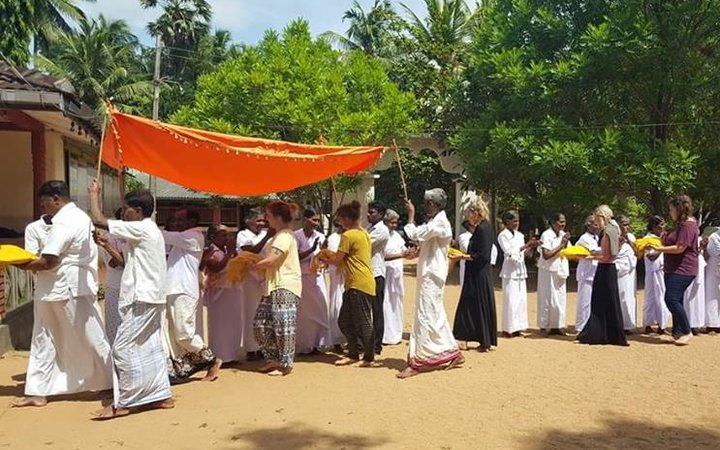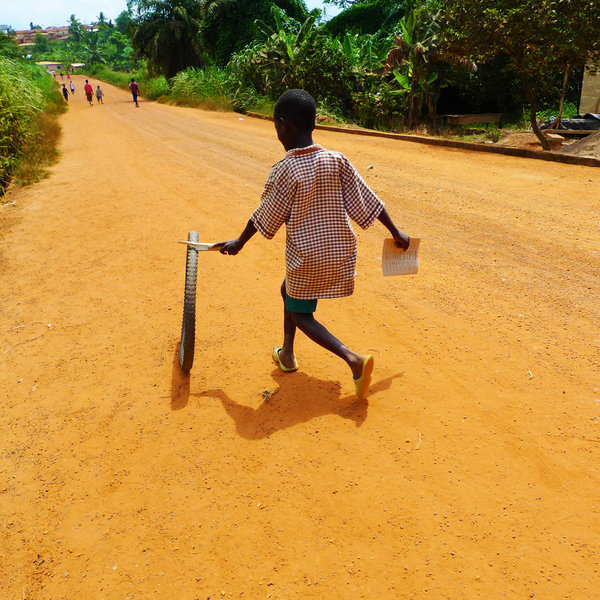Michigan State University
During my trip to Sri Lanka with Work the World, I chose to spend a week in a small rural village situated inland, in the North Central province of Sri Lanka. I chose to add the week to my city-based placement because I was really interested in learning about Ayurvedic medicine and how alternative medicine was practised in Sri Lanka. Ayurvedic medicine is a traditional holistic natural medicine, said to be one of the oldest in history, originating from India. I had heard of this type of medicine before in the US, however it’s more often associated with spa treatments. I thought it would be really interesting to learn more about the attitudes to Ayurveda, as well as the practice and actual treatments.

At the end of my city based placement, I spent the weekend in Trincomalee (known as Trinco), a beachside resort, which was pretty close to the village. The journey was less than an hour, and when we arrived we came into a very small, quiet, rural village. The Work the World guide met us when we arrived at the village, and we felt very welcomed by the guide into their village, and I was both nervous and excited for the week ahead. I knew it would be very different to the Work the World house because, you are living with a Sri Lankan community rather than other students from around the world.
It was definitely a big change, but a good one, too, and I felt WtW had prepared us well for the week.
The week overall was jam packed. In the morning, we would go to the Ayurvedic clinic and see patients with different conditions, such as slipped discs and fractures, dislocated shoulders, skin conditions and much more. We got to see how the doctor assessed these patients, how he assigned their treatments and also how he made the medicine. We got involved by helping make some of the treatments, such as cooking oil in a big pot, crushing willow bark, leaves and bamboo. This concoction would go into the treatment they were using; they would use these leaves, bark and oils, and wrap it in a bandage on the area that needed treating. The doctor also had a big stack of old cards, where he had all of his recipes and potions for the medicines he was using, which had been passed down from generation to generation. These were absolutely fascinating!

It was definitely a whole different way of care. It was more holistic than we’d seen, and the doctor really wanted to know about the patient's lifestyle and what treatments they had already tried. He also didn’t charge money for treatment, however, they would give donations wrapped in betel leaves which symbolises good fortune and prosperity.
The actual facilities are so different to the city hospital. You definitely had to re-shape your thinking and realise that Ayurvedic medicine, whilst it’s not evidence based science, the patients and the doctor truly place all of their faith and really believe in the treatments. A lot of it obviously is the different herbs they use; oils, leaves, spices and natural ingredients–but also the mindset that they come in to the clinic with.
They have a ward where the patients that are staying long term receive daily treatments which we got to assist with. We also got to see cupping therapy and the practitioner demonstrated on us, which was really interesting, because we had never experienced that before. It was very insightful to see a different way of thinking and a different way of treating people. It is quite common that patients may have left a city hospital after receiving all possible treatments and now are trying alternative therapies.

I remember one older lady who had come with her family, on a homemade stretcher made from leaves and bamboo. She had a severe back problem. The doctor suggested the patient return on a daily basis to receive treatment as the family lived nearby. He thought that over time he could help her. It was very interesting, there was not an immediate result but even just knowing she was receiving the medicine seemed to make her pain less: perhaps it was her faith in the medicine, or knowing that she was finally receiving treatment that helped her.
Sometimes, it was strange seeing treatments we would not using in hospitals in the US. I think whilst the treatments aren’t necessarily evidence based or scientific, there is definitely a point to them. When using natural things that have real qualities/curatives, they put all their faith in the treatment and the doctor, which for some is almost more important, even if it doesn’t necessarily cure their condition.

It helps how they mentally view their condition; there’s a psychological benefit, and it’s almost religious.
The clinic itself felt much more like a home, there was one building where the doctor intakes patients. They just show up without appointments, with their donation wrapped in leaves. He sees them in a small examination room with just a table. Patients were very respectful, remained silent, listening, and most were clearly pleased to see him. Patients often gave a bow and this proved how respected and trusted the Ayurvedic doctor was. He would examine and decide on the form of treatment, and would either perform the treatment there in the examination room or he would do the treatment on the ward.

There was also a pharmacy, which was unlike any pharmacy I have ever seen, which had all sorts of different oils, herbs, and leaves and different little bottles of things (which we had no idea of the contents) stacked around. He uses all these ingredients and prescribed them to people…it was certainly very different from the pharmacy back in the city, let alone a pharmacy in the US!
The house we stayed in during the week was absolutely lovely. There was 5 girls including me staying there the week that I was there. We had bunk beds and we ate all 3 meals a day at the house, and it was wonderful food, including chicken curry and mango curry. It was wonderful to get to try the dishes and see what the traditional food was like.
Our guide looked after us every day, and he would escort us around and show us all the sites, take us to the clinic, and really help us get involved, as well as translate for the doctor so we could understand what was he was saying. He was very helpful and friendly.
Each morning was spent at the clinic and each afternoon was jam-packed diving into cultural experiences. One day we did a train ride, which went to the beautiful Minneriya National Park, and we also did a jeep safari. We got to see wild elephants which was my favourite memory of the whole time I was with WtW! We hiked a mountain to a ruin of an old buddhist monastery, which had amazing views and we got to see Sri Lankan monks, too. We didn’t get to talk to them, but we got to see them in their natural environment which was fascinating. It was the full moon holiday when we were at the temple, so we got to participate in a ceremonial walk. After the ceremony we got to serve the community a meal which was a really special way to show our appreciation for being accepted into their community.

Day to day life in the village was very interesting. It was fascinating to see how a traditional Sri Lankan families live, and the village was very family oriented and traditional. We got to see how they do laundry, we received a cooking lesson where we learned how to prepare a traditional curry and noodles from scratch.
We truly had a new experience every day.
I would absolutely recommend the experience, it gave me a whole different perspective on Sri Lankan medicine, and I was grateful to really able to see how a traditional Sri Lankan community lives, and really interact with the local people. We got to do amazing experiences we maybe wouldn't have been able to do in the city hospital, too. I would 100% recommend it - it was an amazing experience, and I really gained so much during the week.
My one piece of advice for anyone considering the Ayurvedic week is to go in with an open mind, and to try to put aside your preconceived notions of holistic therapy and medicine. Try to see what the patients are going through, understand that whilst the medicine isn’t necessarily evidence based or scientific, it’s what they place their faith in and so should be respected.

%20Thumbnail.png)







